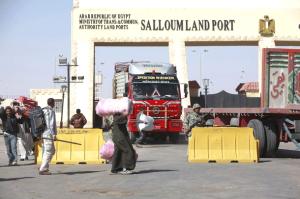
After the dust cleared and the votes were counted for Egypt’s newest constitutional referendum, the interim regime cheered, announcing that the results represented “a clear endorsement of the roadmap to democracy, as well as economic development and stability”. Others were more critical, though perhaps fewer than might be expected were particularly public about their disapproval. For good reason too, considering that the weeks leading up to the vote were marred with everything from denouncing to arresting proponents of voting No. The title of Maher Hamoud’s article in the Guardian captures the situation perfectly: “Egypt will vote yes to the new constitution, but it won’t bring stability.”
Now that the referendum has flopped its way into the history books, the question remaining is the titular one: what reason is there to be bullish on Egypt’s future? I mean to pose this question in two ways: both in the narrow, market-optimism sense of “bullish” and in terms of a more general confidence in the trajectory of the country. Of course, these two points are related; the economy of Egypt, like any country, is bound to the stability of the wider society. Putting this aside for the moment, the two views deserve individual consideration.
First, in terms of Egypt’s political future, despite the worsening conditions for the country’s nascent civil society, there is reason for patient optimism. Egyptians have progressed past a decisive barrier. As Khaled Diab recently wrote, “the tyranny of fear” no longer reigns in the mind of Egyptians, and it is a mistake to think Egyptians will abide by a brutal leader for long. It is unclear how many more presidents Egypt will have to dispose of before those who would seek to lead the country realise this. Subsequently, I don’t think it is a question in the minds of current discontents whether or not the revolution will be successful in delivering conclusive democratic reform. Given the current state of the country, optimism and hope may be the only fuel available for activists.
The problem with revolutions is that they have the tendency to take a bloody long time, with a sadly common emphasis on “bloody.” This is why I remain pessimistic about Egypt’s economy. Given the speed at which many of today’s economies operate, I am skeptical that Egypt can keep up; others are less cynical than I. However, there is a continued failure to recognise that current measured signs of improvement and reform fail to lessen or address deep inequities that long prevented sustainable economic development in Egypt.
More to the point, investors will continue to remain skittish towards the market — or foolish to enter it — if economic growth persists in an unsustainable manner. Any potential short-term gains during periods of temporary stability are marred with uncertainty in the long run until underlying economic needs are met. The interim government offers pseudo-stability in politics—a mask for what is effectively military fascism, and this goes hand-in-hand with pseudo-stability in the economy. Such tactics are little more than Mubarakonomics 101: the state of Egypt’s poor remains largely unchanged, and economic activity continues to benefit few other than the wealthy elite.
The continued political instability makes real economic reform nigh impossible, and in turn the lack of real economic reform will continue to destabilise the political situation. While an emboldened citizenry leaves one optimistic about the political future of Egypt despite the economic conditions, current instability comes at a time where major economic events demand just the opposite. The ongoing diplomatic feud over the Ethiopian dam and Egypt’s inability to keep up regionally, let alone internationally, are enough to paint a grim economic picture. By the time there is legitimate national leadership, what will be left of an economy already in the midst of crisis? I suppose in the worst-case scenario of a full-blown depression, there is the chance that the economy could be restarted with the sales of Sisi-emblazoned chocolates. At least then his many admirers would have something to actually thank him for.




